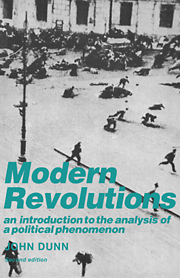Book contents
- Frontmatter
- Contents
- Preface to the first edition
- Introduction to the second edition
- Introduction: the ideological dilemmas of moden revolution and its analysts
- 1 Russia
- 2 Mexico
- 3 China
- 4 Yugoslavia
- 5 Vietnam
- 6 Algeria
- 7 Turkey
- 8 Cuba
- Conclusion: approaches to the ideological assessment and causal explanation of modern revolutions
- Notes
- Bibliography: guide to further reading
- Supplementary reading, 1971–88
- Index
- Frontmatter
- Contents
- Preface to the first edition
- Introduction to the second edition
- Introduction: the ideological dilemmas of moden revolution and its analysts
- 1 Russia
- 2 Mexico
- 3 China
- 4 Yugoslavia
- 5 Vietnam
- 6 Algeria
- 7 Turkey
- 8 Cuba
- Conclusion: approaches to the ideological assessment and causal explanation of modern revolutions
- Notes
- Bibliography: guide to further reading
- Supplementary reading, 1971–88
- Index
Summary
There may be much dispute about why the Russian revolution happened and even more about what it means that it happened; but there is at least merciful unanimity as to when it happened. When it comes to the Mexican revolution, matters are not so simple. From some points of view it is plausible to argue that there has still not been a real revolution in Mexico. But, on the other hand, it is at least intelligible, if not perhaps terribly sensible, to ask as the title of a recent American work implicitly does whether the revolution is yet dead? The title of the single governing party in the country, the Institutional Revolutionary Party (P.R.I.), displays a nice ambivalence. Clearly in itself such a title would not preclude the government from being the inheritor of a genuine revolution. It would in many ways be no bad title for the Soviet Communist Party itself. But it does emphasize one sharp contrast between the two events. The Russian revolution identifies itself, tendentiously enough, as an instance of a general theory of history and society. It is supremely universalist in its pretensions. In ideological stance, except for the most gloomily and temporarily tactical of reasons under Stalin, it was Communist first and Russian second. When the German Communist Paul Levi suggested in all innocence as a motto for the Comintern ‘Russia expects everyone to do his duty’, he meant that the duty was a duty to the historical future of humanity, not merely one to the political conveniences of the Soviet fatherland.
- Type
- Chapter
- Information
- Modern RevolutionsAn Introduction to the Analysis of a Political Phenomenon, pp. 48 - 69Publisher: Cambridge University PressPrint publication year: 1989



